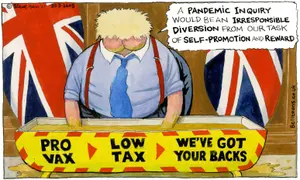
"The first person who, having enclosed a plot of land, took it into his head to say this is mine and found people simple enough to believe him, was the true founder of civil society" - Jean-Jacques Rousseau, 1755, 'Discourse on the Origin of Inequality'.
Rousseau posits that the original, deeply flawed social contract, which led to the modern state, was made at the suggestion of the rich & powerful, who tricked the masses into surrendering their liberties to them & instituted inequality as a fundamental feature of human society.
At the end of the Discourse on Inequality, Rousseau explains how the desire to have value in the eyes of others undermines personal integrity & authenticity in a society marked by interdependence.
In 'The Social Contract outlines the basis for a legitimate political order.
In 'The Social Contract outlines the basis for a legitimate political order.
It developed some of the ideas mentioned in earlier works, & the treatise begins with the dramatic opening lines, "Man is born free, and everywhere he is in chains. Those who think themselves the masters of others are indeed greater slaves than they."
Rousseau claimed that the state of nature was a primitive condition without law or morality, which human beings left for the benefits & necessity of cooperation. As society developed, the division of labour & private property required the human race to adopt institutions of law.
In the 'degenerate' phase of society, man is prone to be in frequent competition with his fellow men while also becoming increasingly dependent on them.
This double pressure threatens both his survival & his freedom.
This double pressure threatens both his survival & his freedom.
According to Rousseau, by joining together into civil society through the social contract & abandoning their claims of natural right, individuals can both preserve themselves & remain free.
This is because submission to the authority of the general 'will of the people' as a whole guarantees individuals against being subordinated to the wills of others and also ensures that they obey themselves because they are, collectively, the authors of the law.
Sovereignty (power to make the laws) should be in the hands of the people, but he makes a distinction between the sovereign & the Govt. The Govt is judges, who implement & enforce the general will. The sovereign is the rule of law, decided on by direct democracy in an assembly.
Rousseau opposed the idea that the people should exercise sovereignty via a representative assembly.
He approved the kind of republican government of the city-state, for which Geneva provided a model—or would have done if renewed on Rousseau's principles.
He approved the kind of republican government of the city-state, for which Geneva provided a model—or would have done if renewed on Rousseau's principles.
France could not meet Rousseau's criterion of an ideal state because it was too big. Much subsequent controversy about Rousseau's work has hinged on disagreements concerning his claims that citizens constrained to obey the general will are thereby rendered free.
The notion of 'the general will' is central to Rousseau's theory of political legitimacy, but is an obscure & controversial notion. Some see it as no more than the dictatorship of the proletariat or the tyranny of the urban poor (as may perhaps be seen in the French Revolution).
But Rousseau emphasizes that 'the general will' exists to protect individuals against the mass, not to require them to be sacrificed to it!
And he's perfectly aware that men have selfish & sectional interests which will lead them to try to oppress others.
And he's perfectly aware that men have selfish & sectional interests which will lead them to try to oppress others.
It is for this reason that loyalty to the good of all alike must be a supreme (although not exclusive) commitment by everyone, not only if a truly general will is to be heeded but also if it is to be formulated successfully in the first place.
Rousseau's idea of the volonté générale ("general will") was not his original idea - it served to designate the common interest embodied in legal tradition, as distinct from & transcending people's private & particular interests at any particular time.
It displayed a democratic ideology: citizens of a given nation should carry out whatever actions they deem necessary in their own sovereign assembly.
The concept was important to Spinoza, from whom Rousseau often differed, but not in insistence on the importance of equality.
The concept was important to Spinoza, from whom Rousseau often differed, but not in insistence on the importance of equality.
For both philosophers the pristine equality of the state of nature is our ultimate goal & criterion in shaping the "common good", volonté générale (general will) or Spinoza's 'mens una' (one mind) which alone can ensure stability & political salvation.
Robespierre & Saint-Just, during the Reign of Terror, regarded themselves to be principled egalitarian republicans, obliged to do away with superfluities & corruption; in this they were inspired most prominently by Rousseau.
According to Robespierre, the deficiencies in individuals were rectified by upholding the 'common good' which he conceptualized as the collective will of the people, derived from Rousseau's General Will.
THE BLOODY WILL OF THE PEOPLE!
THE BLOODY WILL OF THE PEOPLE!
Rousseau's influence on the French Revolution was noted by Edmund Burke, who critiqued Rousseau in "Reflections on the Revolution in France," and this critique reverberated throughout Europe, leading Catherine the Great to ban his works.
This connection between Rousseau & the French Revolution persisted through the next century. As François Furet notes: "we can see that for the whole of the nineteenth century Rousseau was at the heart of the interpretation of the Revolution for both its admirers & its critics."
• • •
Missing some Tweet in this thread? You can try to
force a refresh







